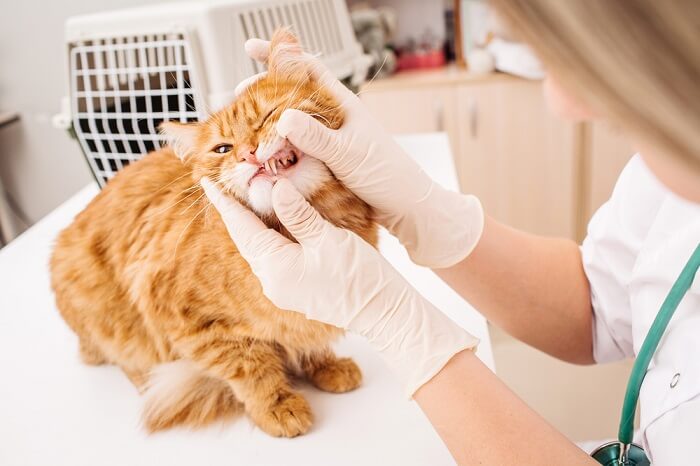
As humans, we have long been aware of the importance of dental hygiene. Poor dental health can lead to pain, gum disease and tooth loss, as well as the risk of infection which can spread around the body. We all clean our teeth and visit the dentist regularly. But what about cat dental cleaning?
Our feline pets’ oral health is also intrinsically linked with their overall health and wellness. But unlike humans, animals are unable to tell us when they’re feeling unwell or have a toothache. Sadly, dental disease is common in cats, so it’s up to us cat parents to step up and make a plan for our pets’ preventative oral care.
Do Cats Need Dental Cleanings?
As a veterinarian, I have seen many patients with dental disease and gingivitis. It often surprises owners just how soon these can develop in a young cat’s life. In fact, dental disease affects between 50-90% of cats over the age of four! In the United States, one study found that the two most common disorders reported in cats visiting the vets were dental calculus and gingivitis.
Signs that your pet may be suffering from dental disease or oral pain include bad breath, drooling and facial swelling. They may also eat less, drop food out of their mouths when eating, hide away more or rub their face against the floor or furniture. You may even see blood, or blood-tinged saliva, from the mouth.
Dental problems are often painful and affect a cat’s wellbeing: the way they eat, groom and behave. Oral problems can also progress rapidly, and lead to tooth loss and even infections that can spread around the body and affect the heart, kidneys and other major organs. Common dental problems in cats include plaque and calculus build up, gingivitis (inflammation of the gums), tooth resorption and periodontal disease.
Keeping on top of your cat’s dental hygiene is not only good for their health, but also their general comfort and happiness.
Professional Teeth Cleaning for Cats
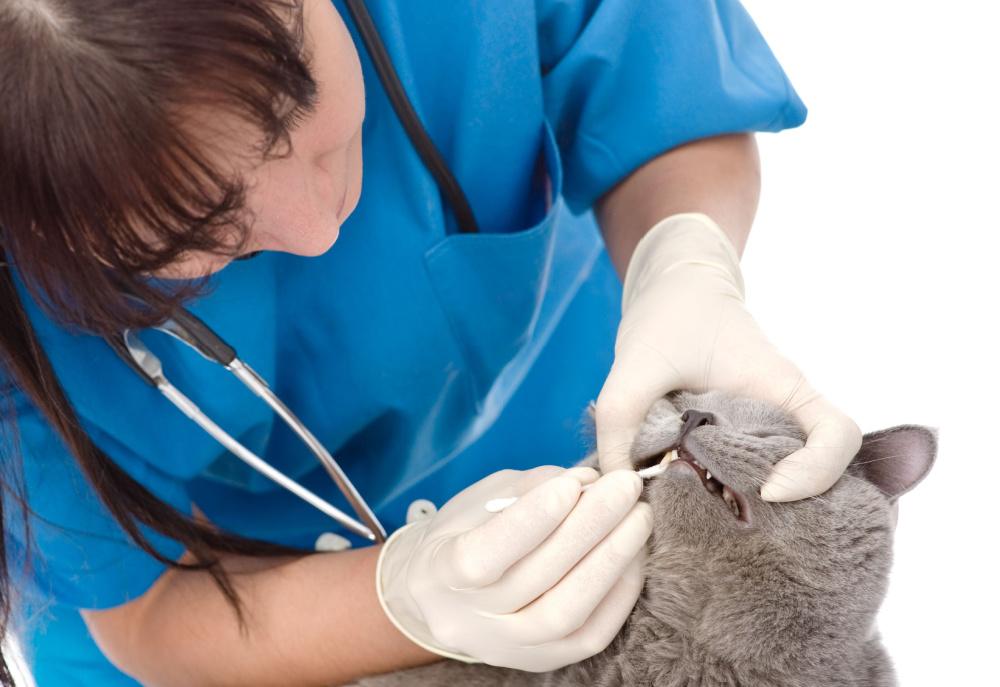
Your cat should have a dental check with a veterinarian regularly – at least once a year.
Cats should have regular health examinations with a veterinarian. One part of this thorough exam will focus on your cat’s teeth and general oral health. Your veterinarian may recommend a dental cleaning if your cat’s mouth shows signs of calculus, decay or abnormalities on the teeth, or any gum disease.
Professional teeth cleaning is performed by veterinarians under general anesthesia. The anesthetic allows the protection of your kitty’s airway as well as keeping them still for the procedure. A special tube is placed in your pet’s airway when under anesthetic. This tube delivers anesthetic gas and oxygen. The tube also prevents any debris during the cleaning process from being aspirated into your kitty’s lungs. Inhaling debris increases the risk of your pet developing pneumonia.
With your kitty safely asleep and with their airway protected, the veterinarian can perform a full assessment of the teeth, including x-rays if needed. The integrity of each tooth is examined, including assessment of the gum health. Teeth are cleaned using an ultrasonic scaler to remove plaque and tartar, including below the gum line where debris often gathers and then polished. If any teeth are broken, have cavities or resorptive lesions, these can be treated as necessary.
Cleaning Your Cat’s Teeth at Home
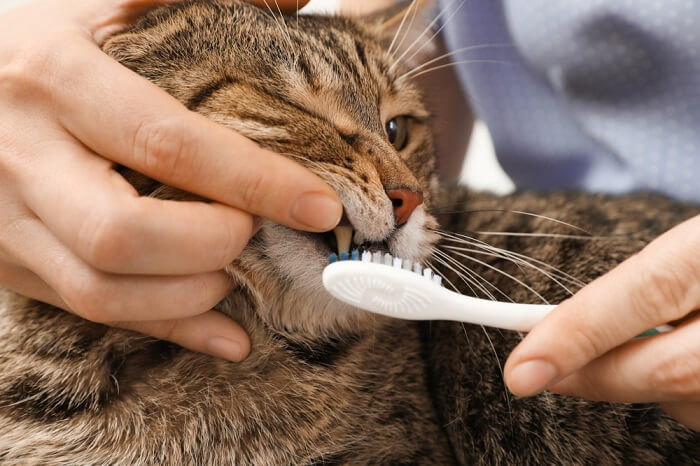
Toothbrushing has been found to effectively reduce gingivitis and other dental problems in cats.
One of the best ways you can care for your cat’s dental health is to make oral care part of your pet’s routine.
Here are some ways to boost your cat’s dental care.
1. Toothbrushing
The most effective oral care you can perform for your kitty is to brush their teeth regularly. Invest in a suitable cat toothbrush, and always use a cat toothpaste (human toothpaste has a high fluoride content).
Unsure how to get started? There’s a great guide to toothbrushing here, but here’s a quick summary:
- Start by getting your cat used to the toothpaste by smearing a little around their mouth, teeth or gums and letting them lick at it
- Then try introducing the toothbrush. At first, just try to touch it around their mouth and let them sniff at it and investigate it
- Practice lifting their gums and touching the toothbrush to their teeth
- Slowly start brushing the teeth gently with toothpaste. Start with the front teeth and gradually work towards the back
- Keep sessions short, and give lots of praise to encourage a positive experience
- Brush teeth regularly – at least twice a week
2. Dental treats
If your kitty is adamant that no brush will touch their delicate, pearly whites then there are a huge range of dental treats from which to choose. It’s important to remember though that many of these treats can be high in fat and calories which may not be suitable for kitties that are overweight or have some health issues. These treats can reward your healthy and active cat while helping to maintain your pet’s fresh breath and oral hygiene.
Read More: Best Cat Dental Treats
3. Dental toys
Dental toys are another great option to help maintain your cat’s dental health while also providing exercise and mental stimulation. Some of these have a net-like material that can act similarly to dental floss for humans.
Other toys may contain pet-safe natural fibers to encourage chewing behavior. Always monitor your pet’s play. Remove broken or damaged toys to prevent anything untoward from happening to your pet.
4. Dental Diets
Nutritionally balanced, prescription dental diets generally contain kibbles of varying shapes and sizes to encourage chewing while providing mild abrasion to the tooth surfaces, removing plaque that can build up. These diets are an excellent inclusion to your kitty’s dental program.
Taking a multi-modal approach toward your kitty’s dental care will maximize the benefits for your pet. Use a selection of dental treats, toys and brushing at home. Coupling this with periodic cleaning under anesthesia will help your pet to maintain a healthy mouth.
Frequently Asked Questions
How much does a professional dental cleaning for cats cost?
A professional cat dental cleaning usually costs between $200-400, but can be more depending on the severity of the dental disease and the extent of the procedure. Your veterinarian will be able to give you a more accurate estimate after an examination of your cat’s teeth.
How often should a cat's teeth be professionally cleaned?
Annual check-ups and a dental clean is advised, as a general rule. This allows your vet to thoroughly assess your pet’s teeth and instigate any treatments or more aggressive preventative methods to protect your cat’s gums and teeth.
Should I be cleaning my cat’s teeth?
It’s a really good idea to incorporate some oral care into your cat’s routine. Establishing regular tooth brushing early is ideal, but there are other homecare options including dental food, toys and treats.
-
Rob van Wessum, Colin E. Harvey, Philippe Hennet, Feline Dental Resorptive Lesions: Prevalence Patterns, Veterinary Clinics of North America: Small Animal Practice, Volume 22, Issue 6, 1992, Pages 1405-1416
-
Kate E. Ingham and others, The Effect of Toothbrushing on Periodontal Disease in Cats, The Journal of Nutrition, Volume 132, Issue 6, June 2002, Pages 1740S–1741S,
-
Lund, E. M., Armstrong, J. P., Kirk, C. A., Kolar, L. M. & Klausner, J. S. (1999) Health status and population characteristics of dogs and cats examined at private veterinary practices in the United States. J. Am. Vet. Med. Assoc.214:1336–1341
-
https://www.vet.cornell.edu/departments-centers-and-institutes/cornell-feline-health-center/health-information/feline-health-topics/feline-dental-disease



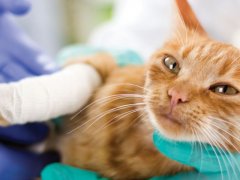
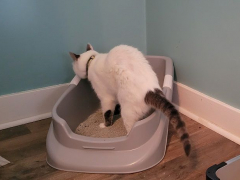
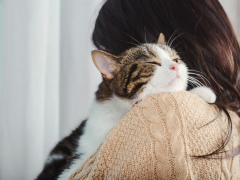


Please cover the dental water-additives that are on the market. Do they really help? Are the ingredients 100% safe?
Thank you
Great idea! We’ll consider it for a future article. Thanks!
All these are for advice from vets in the states, I need to find some help here in Saint John New Brunswick Canada.. Our vets are a lot more expensive here. And I never heard of any vet schools here. I appreciate you getting back to me, thanks a lot
Hello Marilyn, apologies for the late reply. I don’t have any advice specific to your area—a quick search didn’t yield any results—but you may be able to get advice by contacting a local veterinarian or even a local rescue group (as they will often have to seek out affordable vet care themselves).
I had my vet check her over and he told me she has germatitus and it would cost me anywhere between $500.00 to $1000.00. I am a senior on a fixed income, I can’t afford that kind of money. And I can’t find any rescues here that will help me.
What I am asking is there any place in Saint John N.B where I can get some help with a dental cleaning for my cat, My vet says she has gemmantitus and the price was out of this world.. I can pay about 300.00 but they want what is beyond me to do. I need some help from somebody… anything you can tell would be greatly appreciated.
Hello Marilyn, thanks for the comment. I wasn’t able to find any local solutions for you in the Saint John area, but I can direct you to an article on what to do if you can’t afford a vet—most of the tips here should apply to you, and perhaps it’ll be helpful. Wishing you and your cat all the best.
Thank you very much for your help. I really appreciate you getting back to me.
Henry weight should I be cutting my cat’s nails how much should I be brushing his teeth his teet
Hi Haylee, I’m not sure what you’re asking, but you should brush your cat’s teeth daily. Nail trims are really a matter of personal preference, but once a week is a good target for most cats.
what time what kind of toothpaste should I use for my cat and what should I do should I buy dental floss my cat tail what should I do
Hi Haylee, you don’t need to buy dental floss! As for toothpaste, you might like one of the recommendations in our video on the subject.
I have just recently become unemployed, and previously adopted a 3 month old kitten. Please tell me how I can best see to her dental health in my curent curcumsrtances.
Thank you
Donna Israel
Fortunately, a kitten at that age shouldn’t have any dental issues. The cheapest way to care for her teeth would be to take a damp washcloth and gently rub it against her teeth. This will help to acclimate her to the feeling of having her teeth brushed while gently removing anything that may have accumulated there. Once you have a little more cashflow, you might invest in a tube of enzymatic toothpaste. Enzadent is the most affordable brand I’m aware of. I know being unemployed can be stressful, and preventive care could easily slip down your priority list, so it’s wonderful that you’re still making an effort to take care of your kitten’s dental health during this time. Take care.
Something in your website information is hazardous because I clicked on dental treats to learn more and my curser immediately seized up. It finally freed itself and within seconds it seized again and that happens when there’s a virus or malware trying to install itself. You need to check your links!!
Nice tip not heard of that before